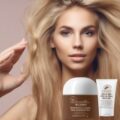Embracing Natural Beauty: African Wisdom for Radiant Skin and Hair
For centuries, African women have harnessed the power of nature to enhance their beauty and nourish their bodies. These time-honored traditions celebrate the inherent beauty of each individual while utilizing locally-sourced, natural ingredients. By exploring these African beauty secrets, we can all learn to embrace a more holistic and sustainable approach to self-care that honors both our bodies and the environment.
Nourishing Oils: The Foundation of African Skincare
At the heart of many African beauty rituals lies the use of natural oils. Rich in vitamins and antioxidants, these oils provide deep hydration and protection for the skin and hair. Some of the most cherished oils include:
- Marula oil: Packed with vitamin C and E, this oil from South Africa helps fight free radicals and promote collagen production.
- Baobab oil: Sourced from the iconic “tree of life,” this oil is high in omega fatty acids and vitamin A, offering intense moisturization.
- Argan oil: A Moroccan treasure, argan oil is renowned for its ability to soften skin and add shine to hair.
- Shea butter: This rich emollient from West Africa deeply nourishes and protects the skin.
Incorporating these natural oils into your skincare routine can help achieve the radiant, healthy glow that African beauty is known for.
Healing Clays: Detoxifying Treatments for Skin and Hair
Clay treatments have been used across Africa for generations to purify and rejuvenate the skin and scalp. Two particularly powerful clays are:
- Rhassoul clay: Mined from the Atlas Mountains of Morocco, this mineral-rich clay gently exfoliates and absorbs excess oil.
- Bentonite clay: Often used in hair treatments, this clay helps to remove impurities and promote healthy hair growth.
These natural clays offer a gentle yet effective way to cleanse and detoxify, leaving skin and hair feeling refreshed and revitalized.
Ancient Remedies: Harnessing the Power of African Plants
African traditional medicine has long recognized the healing properties of local plants. Many of these botanicals have found their way into beauty rituals, offering natural solutions for various skin and hair concerns:
- Aloe vera: Used across the continent, aloe vera gel soothes and hydrates the skin while promoting healing.
- Moringa: Known as the “miracle tree,” moringa leaves and oil are packed with nutrients that nourish the skin and hair.
- Kigelia: Extract from this African tree has firming and toning properties, making it popular in anti-aging treatments.
By incorporating these plant-based ingredients into our routines, we can tap into the wisdom of African healing traditions and embrace a more natural approach to beauty.
Holistic Wellness: Beauty from the Inside Out
African beauty philosophy emphasizes the connection between inner health and outer beauty. This holistic approach includes:
- Nutrient-rich diets: Consuming a variety of colorful fruits, vegetables, and whole grains to nourish the body from within.
- Herbal teas: Drinking teas made from local herbs to support overall health and promote clear, glowing skin.
- Mind-body practices: Engaging in traditional forms of movement and meditation to reduce stress and promote overall well-being.
By adopting this comprehensive approach to beauty and wellness, we can cultivate a deeper sense of self-love and appreciation for our natural selves.
Sustainable Beauty: Honoring Tradition and the Environment
Many African beauty practices inherently align with modern sustainability principles. By choosing natural, locally-sourced ingredients and minimizing waste, these traditions offer valuable lessons for creating a more eco-friendly beauty routine. Some ways to incorporate this ethos include:
- Opting for multi-use products, such as oils that can be used on both skin and hair
- Choosing products with minimal packaging or recyclable containers
- Supporting fair trade initiatives that benefit local communities
By embracing these principles, we can care for ourselves while also honoring the earth and supporting ethical practices.
FAQ: African Beauty Secrets
Q1: Are African beauty ingredients suitable for all skin types?
A1: Many African beauty ingredients are gentle and suitable for various skin types. However, as with any new product, it’s always best to patch test first and consult with a dermatologist if you have specific skin concerns.
Q2: How can I incorporate African beauty secrets into my current routine?
A2: Start by introducing one or two natural ingredients, such as a nourishing oil or a clay mask, into your existing routine. Gradually experiment with different products and techniques to find what works best for you.
Q3: Are there any potential side effects of using African beauty ingredients?
A3: While natural ingredients are generally safe, some people may experience allergic reactions. Always perform a patch test before using a new product, and discontinue use if you experience any irritation.
Q4: Can men benefit from African beauty secrets too?
A4: Absolutely! These natural ingredients and holistic practices can benefit everyone, regardless of gender. Many African beauty rituals are particularly effective for addressing common men’s skincare concerns, such as razor burn and ingrown hairs.
Q5: How can I ensure I’m purchasing authentic and ethically sourced African beauty products?
A5: Look for brands that prioritize fair trade practices and transparency in their sourcing. Research the company’s values and certifications, and consider reaching out to them directly with any questions about their supply chain and ingredient sourcing.
By exploring and embracing these African beauty secrets, we can not only enhance our natural beauty but also connect with rich cultural traditions and promote a more sustainable, holistic approach to self-care. Let us celebrate the wisdom of these ancient practices and the diverse beauty they honor in each of us.









